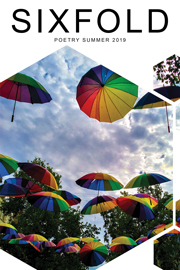
Poetry Summer 2019
fiction all issues

whitespacefiller
Cover Antoine Petitteville
Laura Apol
Easter Morning
& other poems
Taylor Dibble
A Masterpiece in Progress
& other poems
Julia Roth
Lessons From My Menstrual Cup
& other poems
Jamie Ross
Ceaseless Wind. The Drying Sheaves
& other poems
Nicole Yackley
Mea Culpa
& other poems
George Longenecker
I’m sentimental for the Paleolithic
& other poems
Taylor Gardner
Short Observations by Angels
& other poems
Greg Tuleja
No Thomas Hardy
& other poems
Joanne Monte
War Casualties
& other poems
Nathaniel Cairney
Potato Harvest
& other poems
Steven Dale Davison
Wordsmouth Harbor Founder
& other poems
Heather 'Byrd' Roberts
How I Named Her
& other poems
Greenheart
sunny ex
& other poems
Ashton Vaughn
Through the Valley of Mount Chimaera
& other poems
Linda Speckhals
Borderlands
& other poems
Lucy Griffith
Breathing Room
& other poems
Steven Valentine
Written
& other poems
Emily Varvel
B is for Boys and G is for Guys
& other poems
Jhazalyn Prince
Priceless Body
& other poems
Marte Stuart
Generation Snowflake
& other poems
S.J. Enloe
Kale Soup
& other poems
Meghan Dunsmuir
Our Path
& other poems
Nathaniel Cairney
Bumblebee Children
Black-and-yellow fuzz stirs
sparkling swords of emerald grass.
This one was trapped on her side,
rolling like a wounded buffalo
felled at the foot of a mole mountain.
Something heavy weighs her down.
Leaning over at the knees,
I extend a bent white metal rod
that once kept curtains from falling.
She climbs aboard,
then looks at me as if to say,
“Well? Now what?”
I lift my stick toward the fence,
toward the close-cropped bushes,
toward the neighbor’s house,
toward the horizon,
toward forever,
and murmur, “There you go, sweetheart.”
My youngest son, wooden saber in hand,
cocks his head to one side.
“You call it ‘sweetheart’?”
Truly, I did not mean to.
The words emerged on their own,
without thought.
This is what happens
when one spends years of a life
helping to lift smaller creatures from the ground.
Spring’s first bumblebees become your children.
Each a Wildflower
See
this bowl of wildflowers, each
plucked by my son’s small fingers,
placed on the counter,
chosen for a new existence
in clean, cool water.
See
them bloom, thirsty,
dying as soon they are born,
aging, molding, decaying,
a darkening mass shriveling,
staining, returning to earth.
Remember
what each was and still is,
an idea, a germ, a seed,
one among trillions
selected for love’s service,
a child carving one beautiful scar more
On his mother’s flowering heart.
Gravel
The moon brought light but not heat.
Shivering men chained wagons to idling tractors,
numb fingers shaking.
Exhaust growls filled the darkness.
With a clank and a rumble
the whole mess of everything began to warm.
Inside the cab, he dreamed of gravel.
Just last week, he and his father
turned a roadside pile into a driveway.
Their calloused hands gripped shovels,
their boots the ground,
their voices the grit from last night’s cigarettes.
His father spoke of the sea,
a strange naked moment of unrepressed longing.
The old man had seen it once, decades ago.
If you missed it that much, the boy asked,
couldn’t you have gone again?
If only it were that easy, son, his father had replied.
In the darkness,
waiting for the diesel to thaw,
he wondered: why wasn’t it that easy?
Potato Harvest
Fallen potatoes litter
the rond-point’s southwest gutter,
rootless,
lost and jostled
from towering wagons
into mud and puddles,
huddled and crushed like victims
from some civil war
unfolding inside
dusty ash-filled tractor cabs.
Gleaners slip into fields,
ghosts in ragged sweaters,
naked hands grasping
pitchforks and sacks,
hunting scraps next to highways.
Brussels-bound black sedans
roar past.
They disappear
into the crushing gray.
The Last American in Belgium
Crunchy maple leaves
stir in the garden,
turned over and over
by something unseen.
Beyond the fence,
beyond the pasture,
a solitary figure haunts
a narrow broken road.
Two headlights reveal
a man, holding something
in his right hand.
He twirls it without thinking,
as if he has done it
a million times before,
as if the thin dull object
were an extension of his body.
The car passes,
obscuring the man for a moment.
When the street is clear again,
he is gone,
swallowed by shadows
that stretch toward the village
where women huddle
in dim tidy rooms
and grip prayer beads
as the harvest moon rises.
It was only three generations
ago, they remind us,
that nothing on earth could stop
what had no wish to be stopped.
And so,
we were invited.
My creased-brow neighbor
turns from the window.
Wind flusters shutters
and rattles glass panes.
A single light illuminates
his green chair.
His steady hands
offer a thick book
with bone-white pages
and a brown leather cover.
Here lie the dead, he tells me,
yours too.
Each page a catalogue
of ghosts,
a waning light’s gift,
a generation’s warning.
Nathaniel Cairney lives with his family in Belgium, where he writes, travels, cooks, does dishes, and marvels at the ease with which moles explode holes in the rich soil. Originally from the U.S. Midwest, his poems have been published in California Quarterly, Illya’s Honey, and others. He holds an M.A. in English Literature from Kansas State University and is a member of the Society of Children’s Book Writers and Illustrators.
lives with his family in Belgium, where he writes, travels, cooks, does dishes, and marvels at the ease with which moles explode holes in the rich soil. Originally from the U.S. Midwest, his poems have been published in California Quarterly, Illya’s Honey, and others. He holds an M.A. in English Literature from Kansas State University and is a member of the Society of Children’s Book Writers and Illustrators.